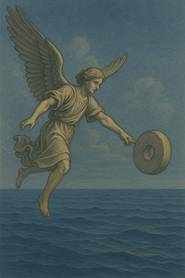Latest Posts
View the latest posts in an easy-to-read list format, with filtering options.
Zechariah 8 concludes this set of visions and prophecies about Judah, Jerusalem, and the temple. The ninth chapter then turns attention to neighboring countries, regions, and cities.
Zechariah 9:1, 2 begins,
1 The burden of the word of the Lord is against the land of Hadrach, with Damascus as its resting place (for the eyes of men, especially of all the tribes of Israel are toward the Lord), 2 and Hamath also, which borders on it [Hadrach]; Tyre and Sidon, though [ki, “because”] they are very wise.
The wording is confusing to most of us. This prophetic “burden” rests primarily upon Damascus. which is in Syria, northeast of Judah. A burden is a threatening (or heavy) prophetic word. The land of Hadrach was not far from Damascus. Dr. Bullinger clarifies verse 1, translating it: “for Jehovah [will look] in mankind’s eye, as well as to all the tribes of Israel’s.” In other words, God will look them in the eye, revealing Himself to the exiled Israelites and to the Syrians as well.
Verse 2 says that Tyre and Sidon “are very wise.” How? What does this have to do with anything? This should be treated as irony, much like we see in Ezekiel 28:3-5, which is another prophecy directed at the city of Tyre:
3 Behold, you are wiser than Daniel; there is no secret that is a match for you. 4 By your wisdom and understanding you have acquired riches for yourself and have acquired gold and silver for your treasuries. 5 By your great wisdom, by your trade, you have increased your riches, and your heart is lifted up because of your riches.
Were they truly wiser than Daniel? Of course not. Tyre’s wisdom was the wisdom of men, which is foolishness as far as God is concerned (1 Corinthians 3:19). On the other hand, the wisdom of God is considered by men to be foolish. Tyre’s “wisdom” had allowed it to accumulate wealth through their knowledge of trade and commerce; yet the city would be destroyed nonetheless, bringing all of its wisdom to naught.
Babylon had already destroyed Tyre on the mainland, but during the siege, the government of Tyre shifted to the island just off the coast. Hence, the city had actually survived as a maritime power through the time of Persia’s domination. However, with the rise of the third beast empire (the Grecian Empire), Alexander the Great used the rubble from the mainland to build a causeway to the island and thereby conquered Tyre. This completed the prophecies in Zechariah 9:4,
4 Behold, the Lord will dispossess her and cast her wealth into the sea; and she will be consumed with fire.
Ezekiel 26:12-14 confirms this, saying,
12 Also they will make a spoil of your riches and a prey of your merchandise, break down your walls and destroy your pleasant houses, and throw your stones and your timbers and your debris into the water…. 14 I will make you a bare rock; you will be a place for the spreading of nets…’
Alexander’s troops literally threw all the debris of mainland Tyre into the sea, scraping the city down to bare rock. The city then became “a place for the spreading of nets,” as fishmen to this day dry their nets on the ruins of old Tyre. The prophecy is remarkable and unmistakable. Zechariah tells us that the fulfillment of this word (or “burden”) would cause the people to look God in the eye, so to speak, and to acknowledge Him as the King of Kings.
Revelation 18 describes Mystery Babylon as a great system of world trade and commerce, and this draws from the prophecies of Tyre. Tyre, then, is a type of Babylon insofar as commerce is concerned, and so the fall of Tyre is similar to the fall of Babylon. Revelation 18:3 speaks of “the merchants of the earth have become rich by the wealth of her sensuality. In regard to the fall of Babylon, Revelation 18:11 says,
11 And the merchants of the earth weep and mourn over her, because no one buys their cargoes any more.
The present trade and tariff war appears to give us the reason why “no one buys their cargoes.” So “every shipmaster” and “as many as make their living by the sea” (Revelation 18:17) weep and wail when their wealth disappears and their import-export business go bankrupt. Just as Tyre was cast into the sea, so also Babylon will be judged as well. Revelation 18:21 says,
21 Then a strong angel took up a stone like a great millstone and threw it into the sea, saying, “So will Babylon, the great city, be thrown down with violence and will not be found any longer.”

The Wycliffe Bible Commentary says that the prophecy about the overthrow of Tyre was fulfilled by Alexander the Great, who conquered the territory more than a century later.
“Such terror and wonder would the triumphs of Alexander occasion, that the eyes of Israel and men of that day would be turned to the Lord for some supernatural interposition.” (p. 905)
The result of this judgment upon Tyre (and Babylon as well) is that men will appeal to God for help to save the world from chaos and the utter destruction of international commerce. We have no historical evidence that the Syrians and Israelites turned to God as a result of the fall of Tyre. More likely, this will be fulfilled in our time when God destroys Mystery Babylon and replaces it with the Kingdom of God.